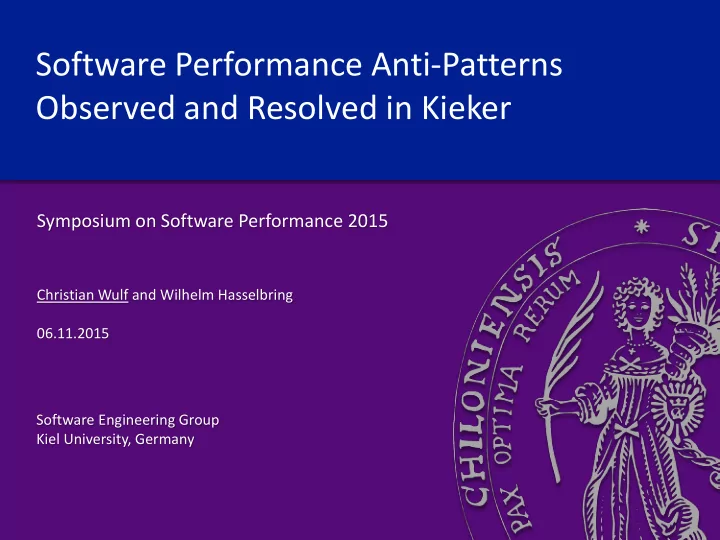

Software Performance Anti-Patterns Observed and Resolved in Kieker Symposium on Software Performance 2015 Christian Wulf and Wilhelm Hasselbring 06.11.2015 Software Engineering Group Kiel University, Germany
Kieker‘s Software Architecture • Low monitoring overhead • Fast Pipe-and-Filter-based analyses (migration currently in progress) Software Performance Anti-Patterns Observed and Resolved in Kieker Christian Wulf and Wilhelm Hasselbring ― 06.11.2015 2
Software Performance Anti-Patterns • Problem solutions which have a negative impact on the performance • Pattern: – name – problem description of the solution – better solution Excerpt of 14 anti-patterns (Smith et al. [3]) “god” Class • Unnecessary Processing • • Excessive Dynamic Allocation Software Performance Anti-Patterns Observed and Resolved in Kieker Christian Wulf and Wilhelm Hasselbring ― 06.11.2015 3
Agenda • Introduction • PAA #1: Parallelizing Sequential Dependencies • PAA #2: Reflection-based Record Reconstruction • PAA #3: Exception-based Buffer Underflow Detection • Conclusion Software Performance Anti-Patterns Observed and Resolved in Kieker Christian Wulf and Wilhelm Hasselbring ― 06.11.2015 4
PAA #1: Parallelizing Sequential Dependencies Context (Kieker 1.12 and below): monitoring node analysis node monitoring records thread thread string string registry registry thread thread string registry records Issues: Two TCP connections • => higher maintenance effort and higher security risk • Thread synchronization (via string registry) => higher communication effort • (Blocking) wait if a monitoring record arrives before its string registry records => reduced throughput Software Performance Anti-Patterns Observed and Resolved in Kieker Christian Wulf and Wilhelm Hasselbring ― 06.11.2015 5
PAA #1: Parallelizing Sequential Dependencies Our solution: monitoring node analysis node monitoring records string string thread thread registry registry string registry records Approach: First, serializes all string registry records • • Then, serializes the record Benefits: • Only one TCP connection No thread synchronization required • => Unsynchronized string registry is sufficient • No waits required Software Performance Anti-Patterns Observed and Resolved in Kieker Christian Wulf and Wilhelm Hasselbring ― 06.11.2015 6
PAA #2: Reflection-based Record Reconstruction Context (Kieker 1.10 and below): int classId = buffer.getInt(); recordClassName = stringRegistry.get(classId); record = AbstractMonitoringRecord.createFromByteBuffer( recordClassName, buffer, stringRegistry); Major issue: Reflective invocation of the record’s constructor • => Slow, especially due to the frequent invocations 1 1 http://docs.oracle.com/javase/tutorial/reflect/index.html Software Performance Anti-Patterns Observed and Resolved in Kieker Christian Wulf and Wilhelm Hasselbring ― 06.11.2015 7
PAA #2: Reflection-based Record Reconstruction Our solution: int classId = buffer.getInt(); recordClassName = stringRegistry.get(classId); recordFactory = cachedRecordFactoryCatalog.get(recordClassName); record = recordFactory.create(buffer, stringRegistry); return new ConcreteRecord(..) Approach: Introduction of a record factory per record type • • Reflective search only once for each record factory ⇒ Caches subsequent accesses in a map Benefits: Direct invocation via Java’s keyword new • => Fast record construction Software Performance Anti-Patterns Observed and Resolved in Kieker Christian Wulf and Wilhelm Hasselbring ― 06.11.2015 8
PAA #3: Exception-based Buffer Underflow Detection Context (Kieker 1.12 and below): try { // save buffer's current position reconstruct(buffer); } catch (BufferUnderflowException e) { // refill buffer // reset buffer's position } Issues: Creation of a new exception object • • Resolution of the current stacktrace => Slow and not used at all Software Performance Anti-Patterns Observed and Resolved in Kieker Christian Wulf and Wilhelm Hasselbring ― 06.11.2015 9
PAA #3: Exception-based Buffer Underflow Detection Our solution: // save buffer's current position boolean success = reconstruct(buffer); if (!success) { // refill buffer // reset buffer's position } Approach: Check whether the buffer has enough bytes left for the next record • • Return a boolean value indicating a buffer refill Benefits: • No creation of an exception Fast buffer underflow detection • No stacktrace resolution Software Performance Anti-Patterns Observed and Resolved in Kieker Christian Wulf and Wilhelm Hasselbring ― 06.11.2015 10
Conclusion • PAA #1: Parallelizing Sequential Dependencies • PAA #2: Reflection-based Record Reconstruction • PAA #3: Exception-based Buffer Underflow Detection http://kieker-monitoring.net http://teetime.sourceforge.net Future work: • Avoid redundant information in before/after record • Avoid frequent record construction/destruction scenarios (reduce GC time) Software Performance Anti-Patterns Observed and Resolved in Kieker Christian Wulf and Wilhelm Hasselbring ― 06.11.2015 11
References [1] E. Gamma, R. Helm, R. Johnson, and J. Vlissides. Design Patterns: Elements of Reusable Object- oriented Software. Prentice Hall, 1995. [2] A. Koenig. Patterns and antipatterns. In The Patterns Handbooks. Cambridge University Press, 1998. [3] C. U. Smith and L. G. Williams. More new software performance antipatterns: Even more ways to shoot yourself in the foot. In Proc. of the Int. CMG Conference, 2003. [4] A. van Hoorn, J. Waller, and W. Hasselbring. Kieker: A Framework for Application Performance Monitoring and Dynamic Software Analysis. In Proc. of the ICPE, 2012. [5] J. Waller, F. Fittkau, and W. Hasselbring. Application performance monitoring: Trade-off between overhead reduction and maintainability. In Proc. of the Symposium on Software Performance, 2014. [6] M. Wooldridge and N. R. Jennings. Pitfalls of Agent-oriented Development. In Proc. of the AGENTS, 1998. Software Performance Anti-Patterns Observed and Resolved in Kieker Christian Wulf and Wilhelm Hasselbring ― 06.11.2015 12
Recommend
More recommend